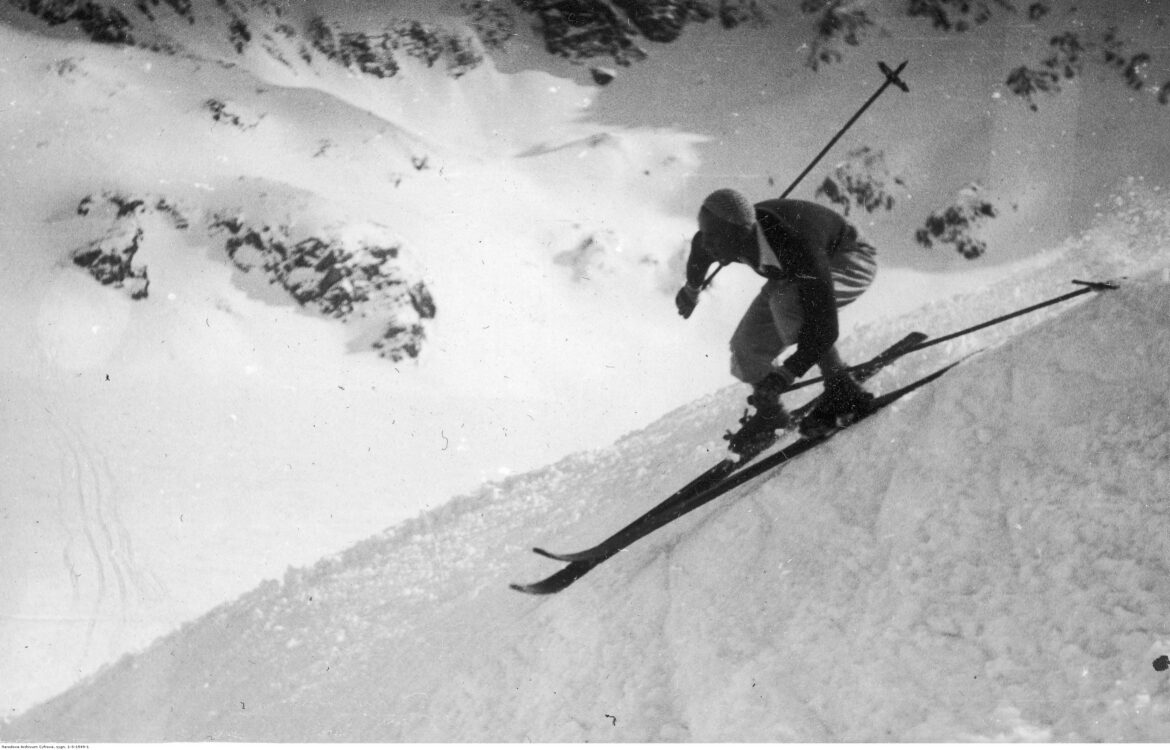It is difficult to find another such a versatile athlete as Bronisław Czech, a man who climbed the mountains, went skiing, painted and wrote poems. During World War II, he carried out extremely dangerous missions for Poland. He was sent to KL Auschwitz because he did not want to cooperate with the Germans.
Bronisław Czech was born in 1908 at the foot of the Polish mountains, the Tatra Mountains – in Zakopane. He loved hiking and practiced winter sports. In the junior category, at the age of 17, he achieved his first victory in cross-country and ski jumping. In his senior sports career, he was also involved in the Nordic combined, downhill and ski relay races. Czech performed well at international competitions. In Zakopane in 1929, during the World Ski Championships, he achieved the greatest success: he was 4th in the Nordic combined and won the downhill race. He represented Poland three times at the Winter Olympics.
Bronisław Czech was an extremely popular athlete in Poland. He was great at skiing and moved as he danced the waltz.
Climber and skier
He had broad sports interests. Czech also practiced mountain climbing. He climbed the northern wall of the peak Kozi Wierch in the Polish Tatra Mountains. He also challenged difficult, inaccessible climbing walls, e.g. the northern wall of the Żabi Koń. As an efficient mountaineer, he was also involved in the Tatra Volunteer Rescue Service. Rescuers performed very dangerous mountain rescue operations to help people who were surprised by the weather or had an accident in the mountains.
He used his love of skiing and mountains in an unconventional way. He used to ski down Polish peaks over 2,000 m above sea level. Thus, he initiated extreme skiing, which is now extremely popular in the Tatras and the Alps.
Renaissance athlete
Another passion of the Czech was gliding, which he took up in the 1930s. In addition, he proved himself in athletics, and table tennis, rode a motorcycle and loved kayaking. Although Bronisław can be called a versatile athlete, it was not the only sport that was at the center of his interests. Czech played the violin and accordion very well. He was engaged in painting and wood carving. He also wrote poems.
Tatra courier
Bronisław Czech decided to use his versatile sports skills for an extremely important, but also extremely dangerous goal. After the occupation of Poland by the Third German Reich and the Soviet Union, Poles created the Polish Underground State – a conspiratorial organization with its own army, civil administration and political authorities. At the same time, the Government of the Republic of Poland in Exile was established in the West (first in France and then in Great Britain). Both state structures had to communicate with each other. Radio communication was not always an option, so it became necessary to send messages by couriers.
The best way to communicate was by crossing the mountains in the south of Poland, incl. the Tatra Mountains. Bronisław Czech was perfect for this type of mission, he knew the Tatra paths very well and he was able to move there. He undertook this task and became one of the “Tatra couriers”. He not only carried messages but also helped people cross the border.
It wasn’t a good relationship
One day in May 1940, when Bronisław Czech was painting one of his Tatra landscapes, he was visited by an Austrian, Sepp Roehrl – a former friend from his sports career, with whom he worked together at the ski school on Kasprowy Wierch before World War II. Roehrl became an officer in the Gestapo. He knew the areas around the Tatra Mountains very well, which is why he turned out to be a valuable employee of the German secret police. He visited Czech for a reason. He made him an offer, impossible to refuse, to lead a junior team of German skiers. For the Czech, choosing this activity would mean betrayal of his native country and cooperation with the German occupier, so he refused.
From the mountains to the camp barracks
This was met with the anger of the Austrian and the consequences of the German occupier. Czech could have escaped to Hungary along the routes he knew through the Tatra Mountains and saved his life, but he did not. The Polish athlete was arrested in May 1940. The Gestapo then came for many Polish sportsmen whom the Germans considered the dangerous elite.
In June 1940, a train with Bronisław Czech, together with over 700 Polish prisoners, set off from Tarnów to the German death camp in Auschwitz. Poles from that transport were the first prisoners there. The athlete worked in the camp, among others in the carpentry shop and museum. He participated in the camp resistance movement organized by Witold Pilecki. During his stay in this place, he used his imagination to see the Tatra landscapes, which he painted from memory.
Life in the camp was very difficult and cruel. Bronisław Czech’s health deteriorated in 1944. The doctors in the camp hospital, suffering from a lack of equipment, were not able to help him. The exhausted body of the athlete, artist and hero refused to function. On June 5, 1944, Bronisław Czech died.
His symbolic grave is located at the Cemetery of Merit at Pęksowy Brzyzek in Zakopane.





